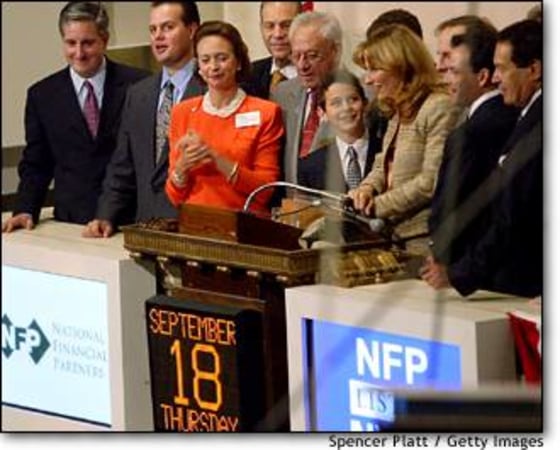The ouster of New York Stock Exchange Chairman Dick Grasso is just the start of sweeping changes likely at the 211-year-old institution, where furor over a massive pay package has laid bare a weak governance structure, experts said Thursday.
As the giant financial market ushered in the post-Grasso era with a rousing stock rally, NYSE officials said they were considering an array of changes to how the exchange is structured, including possibly separating its business and regulatory functions.
“Let me make it clear to you — from today on, the New York Stock Exchange will operate differently,” said Carl McCall, who was appointed lead director after Grasso resigned late Wednesday amid outrage over the $139.5 million payout he received last month.
McCall said no decisions have been made but said a special committee on corporate governance appointed earlier this year is moving ahead rapidly and plans to present its recommendations to the board Oct. 2.
“I think what is fair to say is that this is the first step in what is going to be a very long journey in bringing the New York Stock Exchange into the 21st century,” said Nell Minow, co-founder of The Corporate Library, a research firm that focuses on corporate governance issues. “The outrageous pay package that Dick Grasso received was the symptom, not the disease.”
She and others outlined a series of changes that are considered either likely or necessary for the stock exchange to repair its tattered image and satisfy critics:
Replace all the board members. Nearly all critics agree that members of the board bear responsibility for allowing Grasso’s pay to escalate beyond any reasonable level, triggering the outrage and a loss of credibility. McCall said he knew of no board members planning to step down.
Separate the roles of chairman and chief executive. Grasso, who worked at the NYSE for 36 years, served in both roles since 1995, running the day-to-day operations of the exchange and heading the 27-member board.
Separate the NYSE’s regulatory role from its function as a highly profitable private business operation. “The governance questions disappear if it’s just a private company serving the interest of its members,” said Sarah Teslik, executive director of the Council of Institutional Investors.
Some critics also are calling for greater oversight by the Securities and Exchange Commission, which has been pushing strongly for the changes at the NYSE.
“The securities industry is a historical anomaly left over from the 1934 (Securities Exchange) Act,” said Minow. “We don’t allow any other field to regulate itself the way we do with the securities industry. We need to rethink that in a serious way.”
Teslik said the crisis is playing out against a backdrop of technological change that was resisted by Grasso and NYSE floor traders — who had been among his biggest supporters until the disclosures over his pay. With Grasso gone, she said the door is open to phasing out the open-outcry trading system that has been used at the NYSE since the exchange was founded under a buttonwood tree in 1792.

In addition to $139.5 million, Grasso’s contract guaranteed him another $48 million in deferred compensation, which he said he would forego as criticism mounted. He also is due about $10 million in severance pay, although McCall said the final amount is being negotiated.
One of the most pressing immediate issues for the exchange is to appoint a new leadership team, and many believe a high-profile outsider should be brought in quickly. For now, McCall is leading the board on what he says he hopes is a “very interim” basis. Silicon Valley attorney Larry Sonsini, another board member, was offered the job of interim chairman but declined it.
Grasso’s two top deputies, co-presidents Robert Britz and Catherine Kinney, will oversee the day-to-day business at the exchange until a replacement is named.
Tom McLane, who focuses on corporate governance issues as vice chairman of the Directorship Search Group, said this is an ideal time to separate out the role of chief executive, which probably could be handled by Britz or Kinney, from the role of chairman.
“It would be helpful if they brought in an outside chairman who is highly visible, has impeccable integrity and good common sense, who might examine the makeup of the board and decide whether changes need to be made,” McLane said. He suggested former IBM Chairman Lou Gerstner or former SEC Chairman Arthur Levitt as the kind of “squeaky clean” people who could shake up the exchange’s board and corporate culture.
John Whitney, an emeritus professor at Columbia Business School, said former New York Mayor Rudy Giuliani would be an ideal candidate. Another name mentioned frequently is William McDonough, the former president of the New York Federal Reserve and the current head of the Public Company Accounting Oversight Board. Whitney said there are so many competing interests the job would be as complicated as devising a new government structure for Iraq.
“They need somebody strong, independent and tough-minded,” Whitney said.
While Grasso was never accused of the type of fraud or malfeasance that brought down corporate giants like Enron, WorldCom and Tyco, there was wide agreement that he shared responsibility for his swift and sudden downfall.
“The record of Grasso is rather good in management,” McLane said. “But to the extent he was managing the board more than they were managing him, he obviously was influencing some people.”
Others went further, pointing out that Grasso acted as a gatekeeper for new members of the board and that the system was riddled with conflicts with the chairman wielding police-like powers over the corporate executives and others who served on the board.
“There are new members who had only been on the board a year or two — it’s hard to fault them,” said Teslik. “But there certainly are some who were do-nothing and worse, who probably were in Grasso’s pockets.”
Grasso, in defending his outsized compensation, has said he had no role in determining his compensation over the years, but that claim was hard to swallow for many critics.
“There is no question he selected the directors and he made the committee assignments,” said Minow. “I’m sorry this has eclipsed all the fine things he’s done at the New York Stock Exchange, but he should have thought of that before he accepted the pay.”
